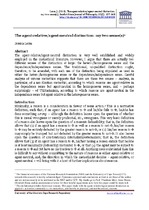| dc.contributor.author | Lerm, Jessica | |
| dc.date.accessioned | 2017-06-05T10:27:42Z | |
| dc.date.available | 2017-06-05T10:27:42Z | |
| dc.date.issued | 2013 | |
| dc.identifier.citation | Lerm, J. (2013). The agent-relative/agent-neutral distinction: my two sense(s). South African Journal of Philosophy, 32(2): 137-148 | en_US |
| dc.identifier.issn | 0379-6175 | |
| dc.identifier.uri | http://hdl.handle.net/10566/2925 | |
| dc.identifier.uri | http://dx.doi.org/10.1080/02580136.2013.810033 | |
| dc.description.abstract | The agent-relative/agent-neutral distinction is very well established and widely employed in the metaethical literature. However, I argue that there are actually two different senses of the distinction at large: the hetero-/homogeneous sense and the dependence/independence sense. The traditional, unqualified distinction ought, therefore, to be amended, with each use of the distinction being stipulated as used in either the hetero-/homogeneous sense or the dependence/independence sense. Careful analysis of various metaethics supports that there are these two senses - analysis, in particular, of a neo-Kantian metaethic, according to which reasons are agent-relative in the dependence sense but agent-neutral in the homogeneous sense, and - perhaps surprisingly - of Utilitarianism, according to which reasons are agent-neutral in the independence sense but agent-relative in the heterogeneous sense. | en_US |
| dc.language.iso | en | en_US |
| dc.publisher | Philosophical Society of Southern Africa | en_US |
| dc.rights | This is the author-version of the article published online at: http://dx.doi.org/10.1080/02580136.2013.810033 | |
| dc.subject | Agent-relative | en_US |
| dc.subject | Agent-neutral | en_US |
| dc.subject | Metaethical | en_US |
| dc.subject | Neo-Kantian | en_US |
| dc.title | The agent-relative/agent-neutral distinction: my two sense(s) | en_US |
| dc.type | Article | en_US |
| dc.privacy.showsubmitter | FALSE | |
| dc.status.ispeerreviewed | TRUE | |
| dc.description.accreditation | Department of HE and Training approved list | |

